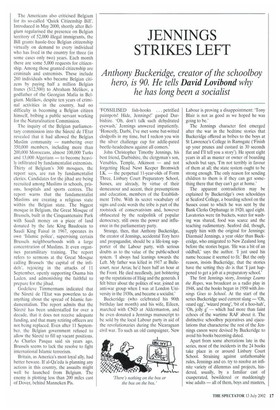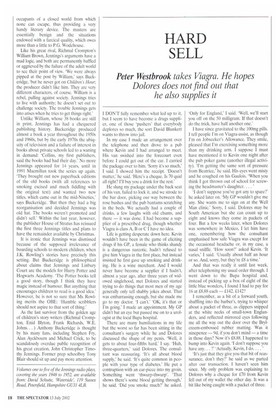JENNINGS STRIKES LEFT
Anthony Buckeridge, creator of the schoolboy
hero, is 90. He tells David Lovibond why
he has long been a socialist
'FOSSILISED fish-hooks . . petrified paintpots! Hide, Jennings!' gasped Darbishire. 'Oh, don't talk such dehydrated eyewash,' Jennings answered impatiently. 'Honestly, Darbi, I've met some bat-witted clodpolls in my time, but I reckon you win the silver challenge cup for addle-pated beetle-headedness against all comers.'
John Christopher Timothy Jennings, his best friend, Darbishire, the clergyman's son, Venables, Temple, Atkinson — and not forgetting Head Newt Keeper Bromwich I.K. — the perpetual 11-year-olds of Form Three, Linbury Court Preparatory School, Sussex, are already, by virtue of their demeanour and accent, their presumptions and education, members of the Establishment Tribe. With its secret vocabulary of signs and code words the tribe is part of the rootstock of conservativism and, however obfuscated by the realpolitik of popular democracy, still owns the power and influence in the parliamentary party.
Strange, then, that Anthony Buckeridge, the creator of Jennings, accidental Tory hero and propagandist, should be a life-long supporter of the Labour party, with serious doubts as to the value of the public-school system. 'I always had leanings towards the Left. My father was killed in 1917 at Bullecourt, near Arras; he'd been half an hour at the Front. He died needlessly, just bolstering up the reputations of Haig and the generals. I felt bitter about the politics of war, joined an anti-war group when I was at London University in the 1930s, and became a socialist; Buckeridge (who celebrated his 90th birthday last month) and his wife, Eileen, marched with CND at Aldermaston, and he even donated a Jennings manuscript to be sold by the local Labour party in aid of the revolutionaries during the Nicaraguan civil war. To such an old campaigner, New Labour is proving a disappointment: 'Tony Blair is not as good as we hoped he was going to be.'
The Jennings character first emerged after the war in the bedtime stories that Buckeridge offered as bribes to the boys at St Lawrence's College in Ramsgate (Finish up your prunes and custard in 30 seconds flat and I'll tell you a story.). He spent eight years in all as master or owner of boarding schools but says, `I'm not terribly in favour of them at all; the state system ought to be strong enough. The only reason for sending children to them is if they can get something there that they can't get at home,'
The apparent contradiction may be explained by Buckeridge's own schooldays at Seaford College, a boarding school on the Sussex coast to which he was sent by the Bank Clerks Orphanage in 1920, aged eight. Lavatories were tin buckets, water for washing was shared, food was scarce and the teaching rudimentary. Seaford did, though, supply him with the original for Jennings: Diarmaid Jennings, a year older than Buckeridge, who emigrated to New Zealand long before the stories began. 'He was a bit of an oddball,' says the author. 'I just used his name because it seemed to fit.' But the only reason, insists Buckeridge, that the stories have the setting they do is that 'I just happened to get a job at a preparatory school.'
The first Jennings story, Jennings Learns the Ropes, was broadcast as a radio play in 1948, and the books began in 1950 with Jennings Goes to School. At the start of the series Buckeridge used current slang — 'Oh, ozard egg', 'wizard prang', 'bit of a hoo-hah', 'Oh, jolly g' — which had more than faint echoes of the wartime RAF about it. The distinctive schoolboy pejoratives and ejaculations that characterise the rest of the Jennings canon were devised by Buckeridge to avoid his books becoming dated.
Apart from some aberrations late in the series, most of the incidents in the 24 books take place in or around Linbury Court School. Straining against unfathomable rules, Jennings and co. try to resolve an infinite variety of dilemmas and projects, hindered, usually, by a familiar cast of exasperated, bewildered or maddeningly wise adults — all of them, boys and masters, occupants of a closed world from which none can escape, thus providing a very handy literary device. The masters are essentially benign and the situations endowed with a farcical quality, which owes more than a little to P.G. Wodehouse.
Like his great rival, Richmal Crompton's William Brown, Jennings's arguments have a mad logic, and both are permanently baffled or aggrieved by the failure of the adult world to see their point of view. 'We were always pipped at the post by William,' says Buckeridge, 'but he never got on Children's Hour, the producer didn't like him. They are very different characters, of course. William is a rebel, pulling against society. Jennings tries to live with authority; he doesn't set out to challenge society. The trouble Jennings gets into arises when he tries to get things right.'
Unlike William, whose 38 books are still in print, Jennings has had a chequered publishing history. Buckeridge produced almost a book a year throughout the 1950s and 1960s, but by the early 1970s the ubiquity of television and a failure of interest in books about private schools led to a waning in demand: 'Collins, my first publishers, said the books had had their day.' No more Jennings appeared for 14 years, until in 1991 Macmillan took the series up again. 'They brought out new paperback editions of the old books (with all references to smoking excised and much fiddling with the original text) and wanted two new titles, which came out in the mid-Nineties,' says Buckeridge. 'But then they had a big reorganisation and decided Jennings was old hat. The books weren't promoted and didn't sell.' Within the last year, however, the publisher House of Stratus has reissued the first three Jennings titles and plans to have the remainder available by Christmas.
It is ironic that Jennings was dismissed because of the supposed irrelevance of boarding schools to modern children, when J.K. Rowling's stories have precisely this setting. But Buckeridge is philosophical about claims that Jennings and Linbury Court are the models for Harry Potter and Hogwarts Academy. 'The Potter books tell a good story, though I think they have magic instead of humour. But anything that encourages children to read is a good idea.' However, he is not so sure that Ms Rowling merits the OBE: 'Humble scribblers should not aspire to that sort of thing.'
As the last survivor from the golden age of children's story writers (Richmal Crompton, Enid Blyton, Frank Richards, W.E. Johns.. . ) Anthony Buckeridge is thought by his many fans, including Stephen Fry, Alan Ayckbourn and Michael Crick, to be scandalously overdue public recognition of his great creation, John Christopher Timothy Jennings. Former prep schoolboy Tony Blair should sit up and pay more attention.
Volumes one to five of the Jennings radio plays, covering the years 1948 to 1952, are available from David Schutte, 'Waterside', 119 Sussex Road, Petersfield, Hampshire GU31 4LB.



































































 Previous page
Previous page